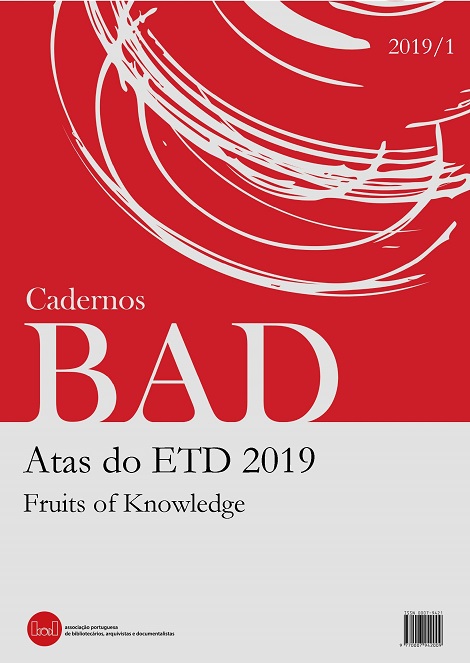The ETD lens on the IR and the University
DOI:
https://doi.org/10.48798/cadernosbad.2041Palavras-chave:
IR content, Unconscious bias, LGBTQ, Institutional repositories, AssessmentResumo
Electronic Theses and Dissertation (ETDs) form the foundation of many institutional repositories (IR), and ETDs can provide an important lens on how the IR represents the work that is being done university-wide. To test this theory, I studied a microcosm of VTechWorks, the IR at Virginia Tech, anticipating that it would encapsulate the characteristics of the repository as a whole. I analyzed the Lesbian, Gay, Bisexual, Transgender, Queer/Questioning (LGBTQ) microcosm through the ETD lens.
I compiled a controlled vocabulary of 161 LGBTQ terms and phrases that I searched in the IR’s ETD collection, recording number of hits for each term. To give context to this data and to understand more broadly who is doing the scholarship and research in this microcosm, I gathered the same data from the IR’s faculty publications and academic units’ web publications which are often aimed at alumni or the public. I searched the same vocabulary in the university website to establish the measure of the LGBTQ domain and to contextualize the data from the IR.
Using a microcosm to look at graduate student works in the IR and university web publications provides manageable data and the opportunity to reflect on the contribution of ETDs to the development of institutional repositories.Downloads
Publicado
Como Citar
Edição
Secção
Licença
Os autores que publicam nos Cadernos BAD:
- Concedem à revista o direito de primeira publicação, mantendo os direitos de autor, de acordo com os termos da Creative Commons Attribution, que permite a partilha do texto com menção obrigatória da publicação inicial nos Cadernos BAD;
- Mantêm o direito de publicar o texto noutros locais (ex.: repositório institucional, capítulo de livro, outra publicação periódica), com menção da publicação inicial nos Cadernos BAD e uma ligação para o sítio na Internet da revista;
- Mantêm a possibilidade e são mesmo incentivados a publicar e distribuir o seu trabalho online (ex.: em repositórios institucionais ou na sua página pessoal) antes ou durante o processo editorial, já que isso pode potenciar interações geradoras de melhoria, bem como aumentar o impacto e a citação do texto publicado (Veja Efeitos do Acesso Livre).


